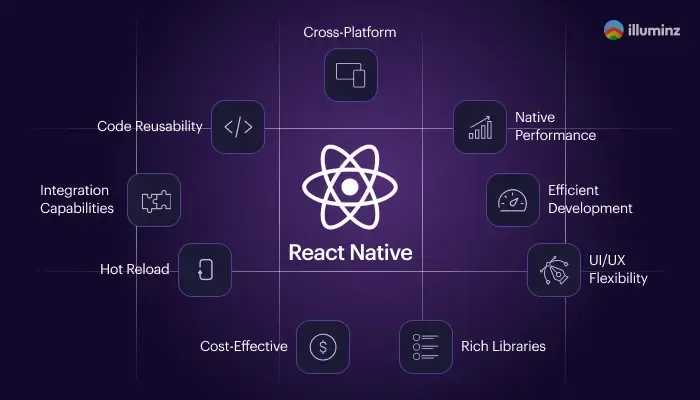Introduction
Ah, the exciting crossroads where mobile app wizardry meets the magic of Artificial Intelligence! Picture this: React Native, the maestro of cross-platform app crafting, dancing hand in hand with AI, the genius behind automation and future prediction.
It's like witnessing a symphony of innovation! And guess what? Our journey today? Well, it's all about diving headfirst into this captivating fusion. Buckle up, because we're about to unravel the enchanting tale of React Native and AI coming together to reshape the way we build and experience mobile apps.

React Native: Changing the Dynamics of App Development
React Native, a Facebook brainchild, is revolutionizing how we approach app development. This open-source framework allows developers to write a single codebase that works seamlessly on Android and iOS platforms.
With its ability to deliver a truly native feel and its ease with JavaScript - a language many developers are already familiar with - React Native is proving to be a game-changer in app development. It streamlines the development process, cuts costs, and accelerates time to market, making it a popular choice for startups and large corporations.

Artificial Intelligence: Bringing a Paradigm Shift in User Interactions
Artificial Intelligence (AI), on the other hand, is about making machines smart. It's about creating systems that can understand, learn, and adapt, making decisions based on data patterns.
AI, powered by its subsets like Machine Learning (ML), Natural Language Processing (NLP), and Deep Learning, pushes the boundaries of how apps interact with users. It's enhancing user experiences with features like predictive analysis, personalized recommendations, automated responses, and more.
The Synergy of React Native Development with AI: A New Era of Smart Apps
The intersection of AI and React Native is not just an alignment of two technologies; it's a fusion that can spawn intelligent applications. Imagine an e-commerce app built with React Native. Now power it with AI. The app could track user behavior, understand preferences, predict future actions, and tailor responses accordingly.
For instance, if the app identifies that a user is often browsing sports gear late at night, it can push a personalized notification around that time, suggesting a deal on a popular sports item. Such a high level of personalization can boost engagement and conversion rates.
Diving Deeper: The Pros and Cons
Pros of Combining AI and React Native:
- Superior User Experience: The ability of AI to analyze user behavior and make intelligent recommendations can transform the user experience. Combining this with the native-like feel that React Native offers results in superior UX.
- Cost and Time Efficiency: React Native enables code reusability for multiple platforms, reducing development time. AI, on the other hand, can automate tasks, adding to operational efficiency.
- Greater Engagement: AI can help predict user behavior and preferences, enabling personalized content delivery. This can lead to higher user engagement rates.
- Seamless Cross-Platform Accessibility: React Native can smoothly work on different platforms, and this fits well with how AI is widely used. This teamwork lets developers make AI-based apps that can work on many kinds of phones, making them available to lots of people.
- Cognitive Automation: With AI-infused React Native applications, routine tasks can be automated intelligently. This liberates users from mundane operations, allowing them to focus on more intricate and creative endeavors.
- Ingenious Insights: AI adds an extra layer of cleverness to React Native apps. Developers can use AI to understand better how users behave. This helps them make decisions based on data and improve features that users really find useful.
Cons of Combining AI and React Native:
- Data Security Concerns: With AI, apps need access to user data. This raises data security and privacy concerns.
- Complexity in Development: The integration of AI into a React Native app can increase the complexity of the project.
- Resource Intensive: AI-enabled features can consume more device resources like batteries and data.
- App Size: Integrating AI-related components and models may substantially inflate the app's dimensions. This could discourage users from downloading or updating the app, particularly in areas with restricted internet access.
- Quality Assurance and Troubleshooting: Integrating AI elements with React Native can introduce complexities into the testing and debugging process. Ensuring a seamless interaction between AI and React Native components may require thorough testing procedures.
- Cross-Platform Consistency: While React Native strives to deliver a uniform experience across multiple platforms, variations in AI frameworks' behavior on different platforms could potentially result in inconsistencies or unanticipated behavior within your app.
- Maintenance and Updates: The rapid evolution of AI models and libraries often demands timely updates to ensure continued efficiency. The integration of AI with React Native could potentially introduce maintenance challenges, particularly if updates to one component disrupt compatibility with the other.
Conclusion
In the fusion of React Native and AI, a new realm of mobile app potential emerges, attracting the attention of every react native development agency. Challenges abound, yet developers stand poised to craft intuitive, perceptive apps. As AI's cognitive automation aligns with React Native's versatility, we pave a path to apps that anticipate and exceed user needs. This journey promises a transformative impact on mobile app development, where intelligence and ingenuity converge for a dynamic future.
Frequently Asked Questions on React Native Development with AI
Ques: How can AI capabilities enhance a React Native app?
Ans: AI can bring many benefits, like predictive analytics, personalization, automation of tasks, and more. This can significantly enhance the functionality and user experience of a React Native app.
Ques: What are some use cases of AI in React Native apps?
Ans: There are various use cases like AI chatbots for improved customer support, recommendation systems in e-commerce apps, language learning apps with personalized learning paths, fitness apps with AI-driven workout suggestions, and more.
Ques: Are any specific AI tools or libraries available with React Native?
Ans: Libraries like TensorFlow.js, Brain.js, and Synaptic.js are popular for integrating AI capabilities in JavaScript-based projects like React Native.
Ques: What challenges might developers face while integrating AI capabilities in a React Native app?
Ans: Developers may encounter challenges like data privacy and security concerns, increased app complexity, and higher resource usage. Appropriate strategies and tools should be used to mitigate these challenges.

